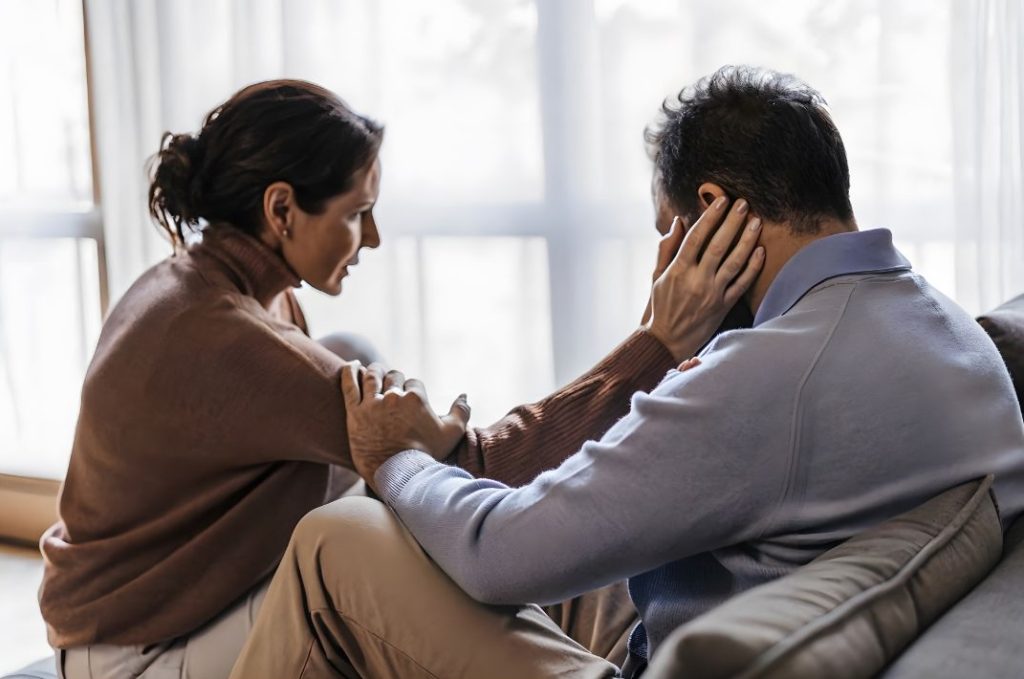Erectile dysfunction (ED) is a concern many couples face, though it’s often spoken about less than it should be. It becomes more common with age, but it can also appear at any stage of adult life, sometimes linked to stress, tiredness, or underlying health issues.
For those experiencing it, ED can feel worrying or even isolating, but it doesn’t affect only the person directly — it can have an impact on relationships, too.
For partners, knowing how to respond is not always straightforward. The subject can feel delicate, and many worry about saying the wrong thing or adding to existing pressure. Yet, approaching ED with patience, openness, and empathy can make a huge difference.
This guide is designed to help you understand how to support your partner with erectile dysfunction, focusing on open communication, emotional intimacy, and taking practical steps together as a team.
Communicate Openly and Without Judgement
The first and most valuable step in supporting a partner with ED is communication. It might be tempting to avoid the subject, either out of discomfort or for fear of upsetting them, but silence often leads to misunderstanding. Instead, aim to create a safe space where your partner feels able to share their feelings without shame or judgment.
Approach the topic gently — for example, choosing a calm moment away from the bedroom rather than during intimacy. Simple reassurance that you care for them regardless of sexual performance can reduce anxiety and open the door to a constructive conversation.
Many people with ED worry that they’re letting their partner down. Hearing that your feelings for them go beyond physical intimacy is a powerful reminder. By listening without criticism and speaking with empathy, you can make it clear that this is a shared challenge, not a personal failing.
Encourage a Visit to the GP
Erectile dysfunction is sometimes more than a temporary concern — it can be linked to underlying health issues such as cardiovascular conditions, diabetes, or psychological stress. For that reason, encouraging your partner to visit a GP is an important step.
Framing the appointment as proactive rather than embarrassing can help reduce hesitation. A simple suggestion such as, “It might be good to get this checked to make sure everything’s okay,” is supportive without sounding pushy. Offering to go with them, or being available to talk afterwards can also show solidarity.
A GP will consider both physical and psychological factors, ruling out health issues and advising on next steps. Whether the cause is stress-related or linked to another medical condition, professional advice gives clarity and reassurance. Presenting the visit as an act of self-care — much like having a check-up for blood pressure — can make the idea easier to accept.
Focus on Emotional Intimacy

ED can sometimes lead to feelings of distance in a relationship, especially if physical intimacy becomes more complicated. One way to reduce this impact is by focusing on emotional closeness, which doesn’t rely on sexual performance.
Simple actions like spending quality time together, engaging in shared hobbies, or expressing appreciation can help strengthen the bond. Many people underestimate the reassurance that comes from kind words, a thoughtful touch, or simply being present with one another.
Patience is key. Your partner may already be dealing with self-consciousness, so consistent emotional support reminds them that the relationship is secure. Reframing intimacy as more than physical connection helps ease performance pressure and keeps the relationship fulfilling while you both explore new approaches. Emotional intimacy can become a powerful foundation, supporting the journey towards addressing ED without allowing it to define the partnership.
Explore Other Ways of Being Intimate
For many couples, intimacy has been closely tied to penetrative sex. When ED becomes part of the picture, broadening the definition of intimacy can be both reassuring and rewarding. Physical closeness can take many forms — from kissing, cuddling, and massage, to exploring non-penetrative sexual activities.
The important point is to approach this exploration together, making sure both partners feel comfortable and respected. Consent and open dialogue are central: discussing what feels good, what feels awkward, and what feels exciting helps create a new dynamic that removes pressure while maintaining closeness.
By focusing on pleasure and connection rather than performance, couples often discover new layers of intimacy. This shift can reduce anxiety for the partner experiencing ED, as they realise that intimacy doesn’t disappear when erections are less reliable. Instead, it becomes about creativity, trust, and building enjoyment in different ways — all of which strengthen the relationship.
Manage Expectations Together
Relationships evolve, and so do sexual dynamics. Acknowledging that change is natural helps couples adapt without frustration. When ED enters the relationship, it’s helpful to revisit expectations together. This doesn’t mean lowering standards, but rather reshaping them so intimacy is understood as a shared journey rather than a pressure to “fix” something quickly.
Conversations about expectations might include how often you want to be intimate, the importance of emotional closeness, or simply recognising that every couple’s rhythm is unique. By aligning expectations, both partners can feel reassured rather than disappointed.
Seeing ED as “our challenge” rather than “your problem” makes the situation less isolating. It can transform what feels like a setback into an opportunity to strengthen trust and teamwork. Managing expectations openly also helps remove the sense of performance, replacing it with shared responsibility for keeping the relationship fulfilling.
Be Supportive, Not Pressuring
One of the most damaging responses to ED is applying pressure, whether intentional or not. Pressure — even when subtle — tends to worsen performance anxiety and make intimacy feel stressful rather than enjoyable. Instead, adopting a supportive stance reduces tension and helps rebuild confidence.
This support might mean reassuring your partner that you’re not disappointed, or suggesting breaks from sexual activity if it’s causing worry. Small, positive steps can be celebrated together, such as moments of closeness or relaxed intimacy, without measuring everything by erections alone.
Equally important is avoiding criticism or comparisons. Every couple’s experience is unique, and what matters most is finding approaches that work for you both. By focusing on comfort and encouragement, you help create an environment where intimacy can flourish naturally again. Removing pressure allows enjoyment and connection to return, making the relationship stronger in the long run.
Learn About Erectile Dysfunction Together
Knowledge helps reduce fear and stigma. Learning about ED together can make the subject less daunting and turn it into something you’re addressing as a couple. Reliable sources such as the NHS or charities like the Men’s Health Forum provide clear explanations of causes and management approaches.
Reading or exploring information side by side demonstrates partnership and prevents misunderstandings. It also helps counteract myths — such as the idea that ED only happens in old age or that it means a loss of attraction. Understanding that ED can arise from many different factors makes it easier to separate the condition from self-worth.
The aim isn’t to diagnose or self-treat but to have informed conversations, both with each other and with healthcare professionals. Shared learning can be surprisingly empowering, giving both partners the confidence to talk openly and seek appropriate help without embarrassment.
Erectile dysfunction is far more common than many realise, and it doesn’t have to diminish the quality of a relationship. Approaching the issue with openness, empathy, and patience allows couples to support one another through the challenges. Emotional intimacy, honest communication, and shared learning all play a role in reducing pressure and building closeness.
For those experiencing ongoing difficulties, seeking professional advice is an important step. Speaking with a GP can provide reassurance, identify underlying causes, and suggest safe next steps.
At WePrescribe, we provide confidential, clinically guided support designed to help people understand their health concerns safely and privately. If you want to discover about our erectile dysfunction products or contact us to see how we can help you and your partner move forward together, we’re here ready to help.


